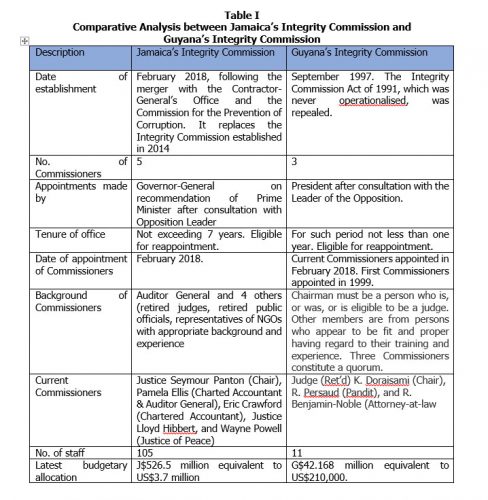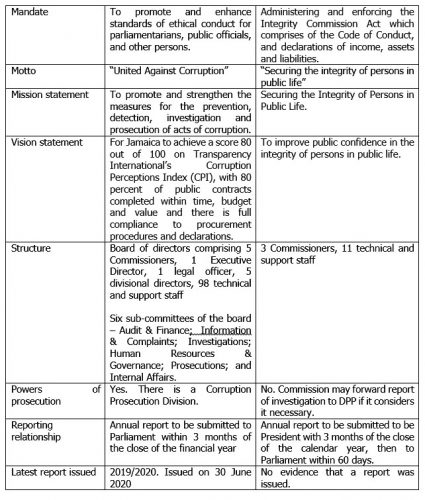Last week, it was reported that the UK Government, through the Department for International Development, is providing Jamaica’s Integrity Commission with approximately £550,000 for institutional strengthening in the following key areas: (i) development of an electronic system for filing of declarations with the Commission; (ii) drafting of Regulations to support the Integrity Commission Act; (iii) crafting of a corruption risk assessment; and (iv) development of a national anti-corruption strategy. The Commission has engaged the services of consultants to undertake these tasks.
In today’s article, we discuss the work of Jamaica’s Integrity Commission since there are important lessons to be learnt in relation to the functioning of our Integrity Commission. This is especially so, considering that Guyana is now an oil producing nation with the expectation of significant flows of oil revenues into the Treasury. As former Speaker of the National Assembly Ralph Ramkarran puts it in his 22 November column in the Stabroek News:
Guyana is entering a new era about which we have little or no experience. The doors are wide open for large scale abuse, bullyism, conflict of interest, theft, bribery, corruption and other traumas that have afflicted most oil producing countries…The question should not be if we need an enforceable code of conduct.
It should be how fast we can get it in place. If public opinion takes this matter up, a voluntary, unenforceable, code might be attempted. This would be a waste of time. It would not be enforced. The Integrity Commission, in an expanded role, might satisfy the requirements of an investigative body.
Jamaica’s Integrity Commission Act
Jamaica’s Integrity Commission is a Commission of Parliament, responsible and accountable to Parliament responsible for monitoring and reporting to Parliament on the operations and effectiveness of the Integrity Commission Act. The Commission came into being on 22 February 2018 following the passage of the Act in the House of Representatives in January 2017 and its approval, with 103 amendments, by the Senate. The Act merged the roles, activities and responsibilities of the Office of the Contractor-General, the Commission for the Prevention of Corruption, and the Integrity Commission into a single anti-corruption agency in order to promote and enhance standards of ethical conduct for parliamentarians, public officials, other persons as well as preventing, detecting, investigating and prosecuting acts of corruption.
In the same month that the Commission was established, the Commissioners were sworn in. In July 2019, the Jamaican Parliament approved the Commission’s organizational structure.
The Commission’s mandate, mission and vision
The Commission has as its motto “United Against Corruption”, and its mandate is to promote and enhance standards of ethical conduct for parliamentarians, public officials, and other persons. The Commission’s mission is to enable an orderly and corrupt-free society for citizens, residents, visitors, and investors while ensuring efficient utilization of public resources. Its vision is for Jamaica to achieve a score of 80 out of 100 on Transparency International’s Corruption Perceptions Index (CPI), with 80 percent of public contracts completed within time, budget and value and there is full compliance with procurement procedures and declarations. For 2019, Jamaica has scored 43 on the CPI. The Act defines corruption as including ‘an offence relating to the conduct of any person that constitutes an abuse or a misuse of his/her office (whether or not within the Public Sector) for the purpose of conferring a benefit or an advantage to himself or another person…’.
Organisational structure
The Act provides for the appointment of five Commissioners by the Governor-General on the recommendation of the Prime Minister after consultation with the Opposition Leader. The Auditor General is a permanent member of the Commission, while the four other members are appointed from retired judges, retired public officers with appropriate training and experience, and representatives of non-governmental organizations. The current members are Justice Seymour Panton (Chair), Pamela Ellis (Chartered Accountant and Auditor General), Eric Crawford (Chartered Accountant), Justice Lloyd Hibbert, and Wayne Powell (Justice of the Peace). Their tenure of office is not to exceed seven years, and their appointment can be renewed.
Governance and oversight are provided by the Board of Directors comprising the five Commissioners, while the day-to-day management is the responsibility of the Executive Director. There is one legal officer, five Divisional Directors and 98 technical and support staff. The Board operates via six sub-committees, namely Audit and Finance, Information and Complaints, Investigations, Human Resources and Governance, Prosecutions, and Internal Affairs.
There are three operational divisions – Investigation Division, Information and Complaints Division, and Corruption Prosecution Division. The Investigation Division is responsible for investigating allegations relating to non-compliance with the provisions of the Act; monitoring and investigating the award and execution of government contracts, licences and permits; and investigating alleged acts of corruption relating to the statutory declaration of parliamentarians and public officials; and any other matter that falls within the jurisdiction of the Commission. It has four operational units covering construction and non-construction contracts, special investigations, and financial investigations.
The Information and Complaints Division is responsible for, among others: (i) receiving, recording and examining all statutory declarations filed with the Commission; (ii) making enquiries as are considered necessary in order to certify or determine the accuracy of a statutory declaration; (iii) receiving and recording complaints or information or notification of allegations of acts of corruption, impropriety or irregularity in the award of government contracts or licences, or allegations of non-compliance with the Act.
The Corruption Prosecution Division is responsible for: (i) prosecuting acts of corruption and offences committed under the Act; (ii) providing advice to the Commission concerning acts of corruption and offences under the Act; and (iii) collaborating with the Assets Recovery Agency in relation to seizure, restraint, forfeiture or recovery of any property relating to acts of corruption.
Annual report to Parliament
The Act requires the Commission to report to Parliament within three months of the close of the financial year on matters relating generally to the execution of its functions during the preceding financial year as per the Second Schedule. Information to be reported on includes:
General description of the matters that were referred to the Commission;
General description of the matters investigated by the Commission, including: (i) the number of investigations commenced but not finally dealt with during the financial year in question; and (ii) the average time taken to deal with complaints and the actual time taken to investigate any matter in respect of which a report is made;
Any recommendations for changes in the laws of Jamaica, or for administrative action, that the Commission considers should be made as a result of the exercise of its functions;
The general nature and extent of any information submitted under the Act by the Commission during the year to the Security Forces or any other public body;
The number of matters investigated by the Commission which have resulted in prosecutions or disciplinary action in that year;
The number of convictions and acquittals, and where a charge is laid the time taken to dispose of each matter;
Such other information as the Commission considers relevant. However, no details are to be provided in relation to any matter under investigation by the Director of Investigation or for which criminal proceedings have been instituted by the Director of Corruption Prosecution; and
The audited financial statements of the Commission for the financial year.
On 30 June 2020, the Commission issued its second annual report to Parliament relating to the fiscal year 2019/2020. The report can be found at: https://integrity.gov.jm/sites/default/files/annual_report/Integrity%20Commission%20-%20Annual%20Report%202019-2020.pdf.
From the above analysis, one can glean several shortcomings in relation to the mandate and operations of the Guyana Integrity Commission. We will discuss these in our next article along with our recommendations.












